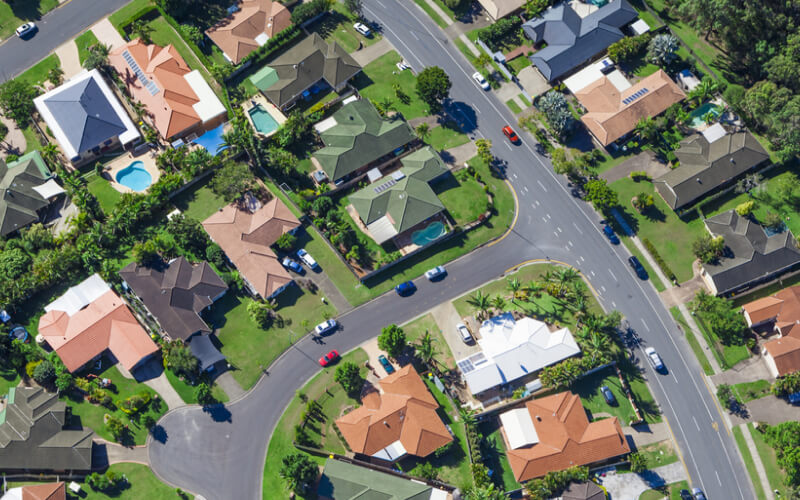Buying a property can be both exciting and overwhelming, whether you’re a first home buyer or you’re adding to an existing property portfolio. With so many factors to consider, investing in a new location can feel like navigating even more unfamiliar territory.
Over the last several years, the property landscape in Australia has seen significant changes due to the global pandemic. Many industries have undergone major adaptations and transitions, and remote working environments have become a new normal for many fields, providing opportunities for individuals and families to explore lifestyle transitions to different states.
Whether you’re moving for a lifestyle change or looking for an investment property interstate, we’ve created a guide to purchasing property interstate that will clarify the main differences within the real estate industry across all states and territories.
Australian Buying Property Buying Process Snapshot
6 Step Guide to Buying Property Interstate in Australia
Exploring buying opportunities outside of your local area can be a good investment, and we’re here to help you make the most of it. Investing interstate may seem daunting, but it can be a lucrative and rewarding experience with the right guidance. We’ve put together some helpful tips to ensure you avoid common pitfalls and become a successful borderless investor.
1. Consider Your Budget
When it comes to investing in property, it’s important to start by figuring out your budget. Take the time to assess how much you can afford to spend on an investment property. If you already own another property with equity, you can use that equity as a deposit instead of using cash. Keep in mind that most lenders prefer 20% deposits to avoid Lender’s Mortgage Insurance, regardless of which state you’re in.
Once you’ve determined your budget, it’s time to consider which market you’d like to invest in. One advantage of investing interstate is that it allows you to get an unbiased opinion of the right price for a home. Sometimes, it can be difficult to see your own home or neighbourhood with the same objectivity that an outside perspective can provide.
2. Gather Your Team of Experts
When buying a property interstate, it’s important to have a team of experts to guide you through the process. A conveyancer is a crucial member of this team, as legal requirements can differ from state to state. A local conveyancer can provide you with advice on regulations, taxes, and ensure that you’re following the necessary steps.
A property manager is another important team member, especially if you plan to rent out the property. They can give you insights on the property’s condition and identify any potential concerns. This will help you make informed decisions about the property’s investment potential.
3. Determine Your End-Game
Investing in property is a great way to build wealth over time, but it’s important to have a long-term strategy. It’s not just a matter of buying a property and hoping for strong returns – you need to manage your investment over time to ensure that it fits with your overall financial circumstances.
One key factor to consider is the long-term behaviour of the area you’re investing in. This means looking at things like development plans, population growth, demographic trends, employment opportunities, and government charges. These factors can all have a significant impact on the performance of your investment over time.
For example, population growth can drive demand for property, which can push up prices and generate strong returns. However, if the demographics of the area change, this can have a negative impact on capital growth. Similarly, if there are major developments planned in the area, this can affect the value of your property.
4. Research the Area Thoroughly
When investing in a property, it’s crucial to do your research and due diligence on the area you’re considering. Don’t just look at past prices or future plans – also think about the present. In addition to long-term growth potential, you want to make sure the property can generate short-term returns.
Consider factors such as nearby amenities and public transport links, as well as whether the location is attractive to potential tenants. Speaking with other investors in the area can also give you valuable insights into the realities of owning an investment property in that particular location.
5. Be Cautious of Varying Costs
It’s essential to keep in mind that costs such as stamp duty, land tax, title transfer fees, and other charges differ from state to state in Australia. It’s crucial to take these expenses into account when selecting an area to invest in, as well as local prices for a buyer’s agent, property manager, mortgage broker, and home loan fees.
A conveyancer can provide you with an accurate estimate of most of the legal and property-related expenses that you’ll encounter. Additionally, mortgage brokers are typically compensated by the lender, allowing them to provide free services to homebuyers and investors.
6. Visit the Neighbourhood
It’s a good idea to physically visit the area you’re considering buying a property – especially if this is a property you’re going to live in and not just an investment property. It gives you a better understanding of the neighbourhood, and you can interact with the locals to learn more about the area. Plan your visit to coincide with several open houses and try to attend as many as possible.
If it’s not feasible for you to visit every property personally, consider hiring a buyer’s agent who can do the job on your behalf. They have expertise and knowledge about the local property market and can provide valuable insights that can help you make informed decisions.
Where Should You Buy: Property Prices Across Australia
Property prices vary incredibly across Australia. Here are the most recent average asking house prices in each state, based on SQM Research.
- Sydney, New South Wales: $1,763,800
- Melbourne, Victoria: $1,178,780
- Canberra, ACT: $1,046,521
- Brisbane, Queensland: $949,057
- Adelaide, South Australia: $772,725
- Perth, Western Australia: $833,137
- Hobart, Tasmania: $791,631
- Darwin, Northern Territory: $672,577
Why a Conveyancer is Essential for Buying Interstate Property in Australia
Buying property interstate in Australia can be a complex process, with legal requirements and regulations different from state to state. This is where a conveyancer can be your best resource. A local conveyancer can provide valuable advice and ensure that you comply with any legal and tax obligations. They can also help you navigate the purchasing process and provide you with peace of mind. With their expertise, a conveyancer can make the process of buying property interstate as smooth and stress-free as possible.
Buying Property Interstate FAQs
1. What’s a cooling off period?
In Australia, a cooling-off period is a period during which a buyer can withdraw from a property purchase without penalty, subject to certain conditions. After the cooling-off period, the contract becomes legally binding, so it’s important to take advantage of this time to conduct inspections and seek legal advice before committing to the purchase.
2. Do I need a real estate agent?
You don’t necessarily need a real estate agent to buy property interstate, but having one can be beneficial, especially if you’re not familiar with the area or the process. An agent can provide valuable local insights, help with negotiations, and guide you through the legal and administrative aspects of the transaction.
3. Where’s the best place to invest in a rental property?
The decision of where to invest in a rental property in Australia should be based on a variety of factors, such as the local market conditions, economic indicators, population growth, and demand for rental properties. Do your research and seek advice from professionals before making any investment decisions.
4. Which state has the best vacancy rates?
According to PropTrack, Perth currently has the tightest rental market in Australia, with a vacancy rate of just 0.85 percent. This represents a 69 percent reduction since March 2020.
5. Which Australian bank has the best interest rates?
Bank interest rates change frequently, so it’s best to do your own research and compare rates from different banks to find the one that suits your needs. You can visit the websites of different banks or consult with a financial advisor for the latest information on interest rates.
Ready to Get Started? Get Your Free Conveyancing Quote Today!
Don’t let the process of buying property interstate intimidate you! A conveyancer can be your key to unlocking success in your investment journey. Take the first step and get a free conveyancing quote today. Settled’s team of experts is ready to assist you in navigating the legal requirements and ensuring a smooth transaction. Contact us now to get started on your interstate property investment journey.
Get a free conveyancing quote
Obligation free quote for home and land conveyancing
Read More












